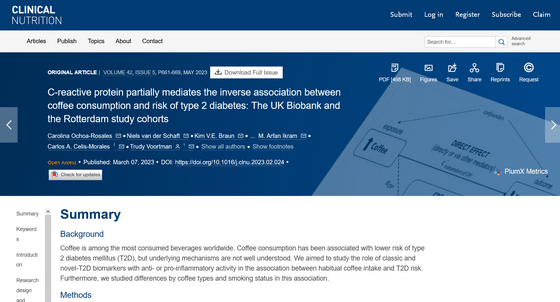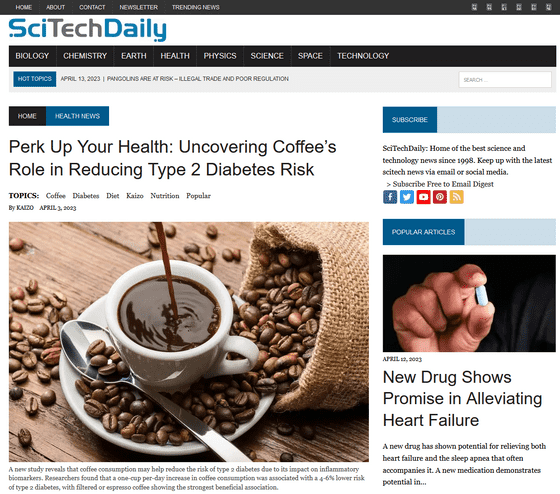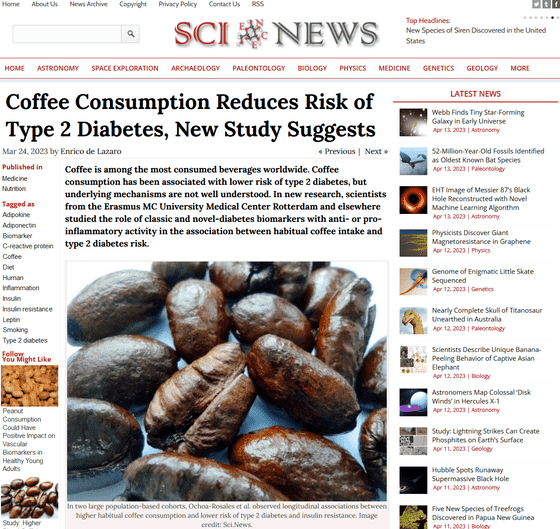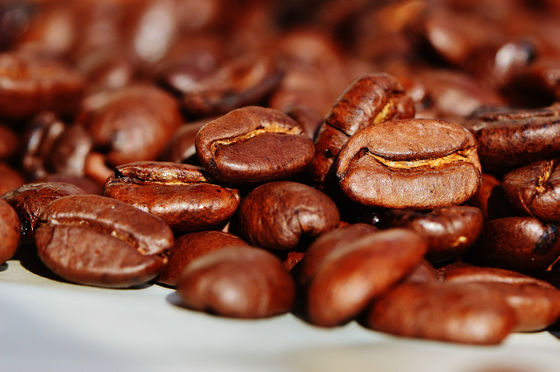A large-scale study reveals the mechanism by which coffee prevents type 2 diabetes

A new study looking at the causes of type 2 diabetes and the effects of coffee reveals how coffee reduces the risk of type 2 diabetes.
C-reactive protein partially mediates the inverse association between coffee consumption and risk of type 2 diabetes: The UK Biobank and the Rotterdam study cohorts - Clinical Nutrition

Perk Up Your Health: Uncovering Coffee's Role in Reducing Type 2 Diabetes Risk

Coffee Consumption Reduces Risk of Type 2 Diabetes, New Study Suggests | Sci.News

How coffee helps lower type 2 diabetes risk: New clues on mechanism
Previous studies have shown that coffee can help prevent type 2 diabetes, but the mechanism is not well understood. Therefore, a research team led by Carolina Ochoa-Rosales, a researcher at the Erasmus Medical Center in the Netherlands, conducted a study that focused on the connection between coffee and a reduced risk of type 2 diabetes.
The data to be studied were collected from two large studies, the UK Biobank and the Rotterdam Study in the Netherlands. 'UK Biobank' contains data of 502,536 British people who participated in the survey from April 2006 to December 2010, of which data such as type 2 diabetes diagnosis information is complete. When extracted, records for 145,368 people were obtained. In addition, the Rotterdam study is a study that has been ongoing since 1990 at the time of article creation, and data for 7,111 out of a total of 14,929 participants was used for this analysis.

As a result of analyzing the relationship between coffee consumption and diabetes diagnostic information using a large-scale data set of more than 150,000 people, the research team found that an increase in coffee consumption by one cup a day could lead to type 2 diabetes. A 4-6% reduction in risk was confirmed. The study participants' coffee consumption varied from 0 to 6 cups a day, but adding one cup of coffee regardless of how much they had been drinking had a beneficial effect.
How to drink coffee was categorized into three types: `` decaffeinated (caffeine-free) coffee '', `` instant coffee '', and `` how to drink coffee beans (drip and espresso with a filter) '', but among them, `` beans The most effective method was the method of sipping and drinking. People who quit or never smoked were also more likely to experience the beneficial effects of coffee.
However, if you drink too much, you may overdose on caffeine, so researchers say that adults should consume up to 400 mg of caffeine a day, and 3 to 5 cups of coffee. . Women who are pregnant or breastfeeding should cut their caffeine intake in half to 200mg.

In this study, Ochoa-Rosales et al. paid particular attention to 'inflammatory biomarkers.' When a person is injured or infected, ``acute inflammation'' occurs as a protective response against it, but obesity etc. also cause ``chronic inflammation,'' in which low-level inflammation continues to occur in the body. Since this chronic inflammation leads to visceral dysfunction and insulin resistance , which are the direct causes of type 2 diabetes, researchers believe that `` type 2 diabetes is a disease of chronic inflammation ''. It is now done.
According to the research team, drinking coffee reduced the levels of `` inflammatory biomarkers '' such as C-reactive protein and leptin in the body. On the other hand, the 'anti-inflammatory biomarkers' adiponectin and interleukin 13 increased. From this, the research team believes that drinking coffee reduces the risk of type 2 diabetes because coffee suppresses chronic inflammation, which prevents type 2 diabetes.
``Previous studies have found that higher coffee intake is associated with a lower risk of developing type 2 diabetes,'' said study co-author Trudy Voortman of the Erasmus Medical Center. However, this study shows that coffee affects the levels of inflammatory biomarkers in the body, and type 2 diabetes has been shown to have an inflammatory profile. , which may be one of the mechanisms, and these findings may also aid future research into the effects of coffee on other inflammation-related chronic diseases.' .
Related Posts:







